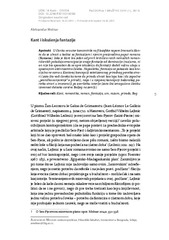Приказ основних података о документу
Kant and the Temptations of Phantasy
| dc.creator | Molnar, Aleksandar | |
| dc.date.accessioned | 2021-10-12T12:15:23Z | |
| dc.date.available | 2021-10-12T12:15:23Z | |
| dc.date.issued | 2015 | |
| dc.identifier.issn | 0353-5738 | |
| dc.identifier.uri | http://reff.f.bg.ac.rs/handle/123456789/2097 | |
| dc.description.abstract | In the article the author concentrates on Immanuel Kant's philosophical musings on phantasy and its artistic products such as novels (Romane). Although Kant was one of the first critics of the early German romanticist endeavors to emancipate the force of phantasy from the domination of the mind/reason, he was also incapable to resist the temptation to give phantasy important role in the cognitive activities of man. Ultimately, phantasy was crucial in Kant's concept of aestheticised natural order of things (because it leads man to perceive nature as beautiful as well as to begin "poetic daydreaming" about nature), but also in his concept of divine worldly order of things after the end of history (because it enables men to be certain about coming of God's kingdom on Earth). | en |
| dc.publisher | Univerzitet u Beogradu - Institut za filozofiju i društvenu teoriju, Beograd | |
| dc.rights | openAccess | |
| dc.rights.uri | https://creativecommons.org/licenses/by-nc-nd/4.0/ | |
| dc.source | Filozofija i društvo | |
| dc.subject | romanticism | en |
| dc.subject | reason | en |
| dc.subject | phantasy | en |
| dc.subject | novel | en |
| dc.subject | nature | en |
| dc.subject | mind | en |
| dc.subject | Kant | en |
| dc.subject | God | en |
| dc.title | Kant and the Temptations of Phantasy | en |
| dc.type | article | |
| dc.rights.license | BY-NC-ND | |
| dc.citation.epage | 26 | |
| dc.citation.issue | 1 | |
| dc.citation.other | 26(1): 5-26 | |
| dc.citation.rank | M24 | |
| dc.citation.spage | 5 | |
| dc.citation.volume | 26 | |
| dc.identifier.doi | 10.2298/FID1501005M | |
| dc.identifier.fulltext | http://reff.f.bg.ac.rs/bitstream/id/890/2094.pdf | |
| dc.identifier.wos | 000410422200001 | |
| dc.type.version | publishedVersion |

